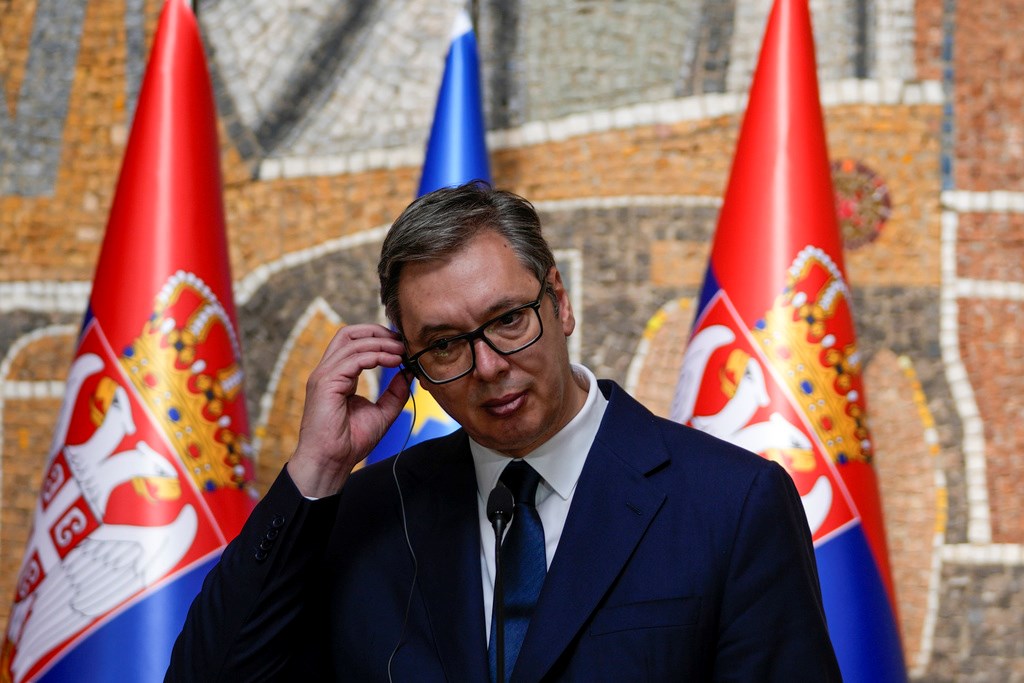Serbia demands expanded NATO presence in Kosovo
Serbian President Aleksandar Vucic has called for an increased presence of the NATO-led Kosovo Force (KFOR) in Kosovo, saying that it would help to "support the Serbian people's safety and security."
-

Serbian President Aleksandar Vucic listens to Hungarian Prime Minister Viktor Orban during a press conference after talks at the Serbia Palace in Belgrade, Serbia, on September 29, 2023. (AP)
Serbia has demanded an increased presence of the NATO-led Kosovo Force (KFOR) in Kosovo, Serbia's President Aleksandar Vucic said on Monday.
"We do not need any kind of wars, any kind of clashes with NATO. On the contrary, we want to see — and I am reiterating this — a bigger presence of KFOR in Kosovo, particularly in the north. That would be, we hope, one of the ways to support the Serbian people's safety and security, particularly in northern Kosovo," Vucic said in an interview with CNN.
He stressed that Serbia is the last country that needs negative developments to take place in Kosovo.
NATO intends to expand the presence of its Kosovo Force (KFOR) in the Republic of Kosovo to ensure security along its border with Serbia, White House National Security Council Coordinator John Kirby said last week.
NATO authorized additional forces to address the "current situation" in Kosovo, NATO Secretary-General Jens Stoltenberg said Friday in a statement.
Stoltenberg also urged all parties to de-escalate noting that the "only way to resolve outstanding issues and reach solutions that respect the rights of all communities," is for Kosovo and Serbia to "engage in the EU-facilitated dialogue."
Read more: Vucic says Belgrade 'must adhere to the truth' despite US warning
The move comes in light of the recent escalation in tensions between the two countries, which have been simmering for years.
A Kosovo police officer was killed, in the northern municipality of Zvecan, on Sunday night, in a shooting. The incident occurred around 3:00 AM local time (01:00 GMT) near the village of Banjska and then moved to become a siege situation in a nearby monastery.
Milan Radoicic, Vice President of Lista Srpska, has confirmed, in a letter, his participation in the attack carried out on Sunday, September 24.
On September 24, Kosovar Prime Minister Albin Kurti said that unidentified people opened fire on Kosovo police officers in the northern municipality of Zvecan, killing one and wounding another. The next day, Kosovo's prosecutor's office said that a fourth Serb had been found dead in clashes in the Bajske village.
The Serb List minority party demanded a full and impartial investigation into the deaths during the Kosovar police's operation and the clashes in Bajske.
Serbia has still not recognized the self-proclaimed independence of Kosovo, its former province that it continues to refer to as "its Kosovo" and Metohija region.
A large ethnic Serb community still residing in Kosovo's north has protested what they consider discriminatory Kosvovar policies that have seen the installment of ethnically Albanian mayors after the April 23 local elections in northern Kosovo where polls were declared valid despite the turnover of less than 3.5%.
NATO has been present in former Yugoslavia since 1999 when it interfered to push out Yugoslav armed forces from Kosovo and established the United Nations Interim Administration of Kosovo.
Read more: Vucic says Serbia has no interest in Kosovo escalation

 3 Min Read
3 Min Read










